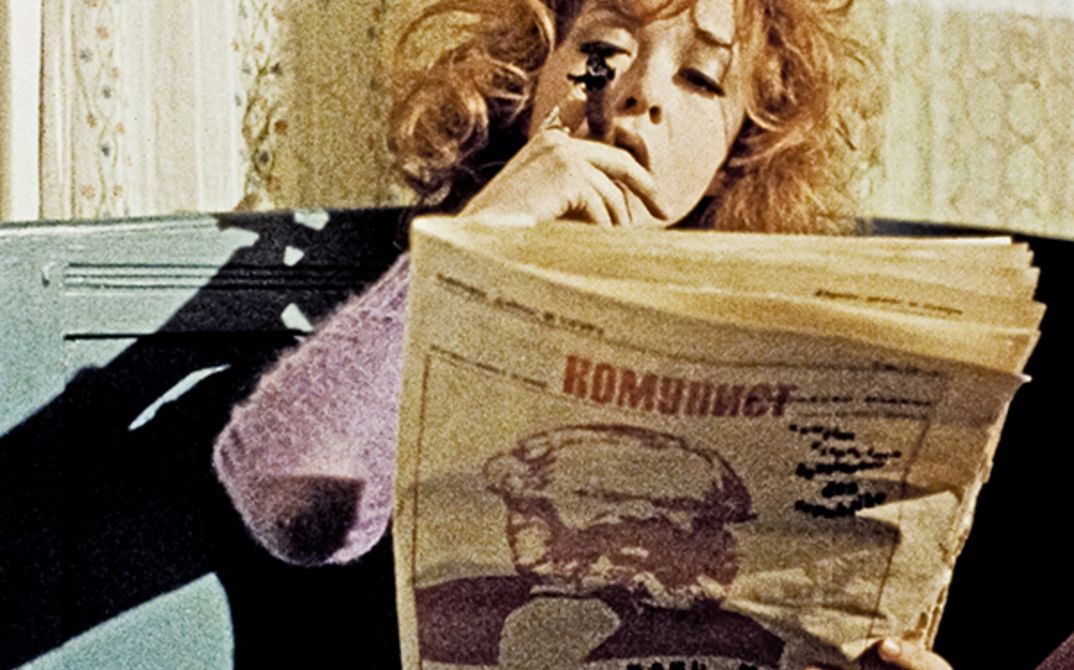Wisdom from the east
The surprise of the Festival (and that’s too mild a way of putting it) has been the Yugoslav director Dušan Makavejev’s W.R. – THE MYSTERIES OF ORGANISM. So far, thanks to the New Cinema Club, Makavejev has been known in England for three films: his first feature title, A MAN IS NOT A BIRD, the censor-ridden The SWITCHBOARD-OPERATOR, and INNOCENCE UNPROTECTED, in which he trained the steps of an amiable execrable film made during one year, as a gesture of patriotism, by a professional strong man. Like Innocence Unprotected, his new film creates its own unique genre. It starts off as a free documentary about Wilhelm Reich, the psychologist, whose often scatty but always humane theories of the cosmic role of orgasmic energy caused him to end his life in an American prison.
From this the film launches into an extraordinary visual extravaganza of poetic connections – the sort of thing that Eisenstein calls “a montage of attractions” but which Makavejev prefers to describe as “a political circus.” He associates the most disparate elements – scenes of Reichian therapy; a hippie stalking the streets of New York in the guise of a GI; Joe Stalin as personified by the actor Michael Gelovani at the peak of the personality cult; two pretty Yugoslav girls actively propagating the ideal of copulation for Communism; a film of mad folk, made under Hitler to justify the practice of euthanasia.
All this is assembled, set in motion, forced into startling collisions in support of the Reich-Makavejev theory that cruelty, violence, inhumanity, political totalitarianism can be directly equated with sexual impotence and frustration. It charges on to surreality. Actuality material shot in the U.S.A. records a Priapian celebration as Jim Buckley, the editor of “Screw Magazine”, has his sexual member cast in plaster, at the same time as one of the Yugoslav heroines is attempting to seduce a Soviet ice skating champion all Stalinist pink plastic heroism and virginity.
(…) This, without doubt, has been the film of the Cannes 1971 Festival; and I am not the only one who has gone to each of its four screenings, just to be reassured that there is no illusion about Makavejev’s talent. Not that he is likely to receive any more gratitude than did Reich from censors of right and left, east and west; but he has certainly put the Yugoslav cinema firmly on the map.
(David Robinson, Financial Times, London, 26.05.1971)
In the footstep of the master
As it entered its second week, the Cannes Film Festival, which has not been prodigal in revelations, was given a salutary jolt by a film with the not very forthcoming title of W.R. – THE MYSTERIES OF ORGANISM. This of course everyone promptly misread as “orgasm”, which as it turns out is not so far off the mark: Dušan Makavejev, maker of Switchboard Operator and Innocence Unprotected, takes as his starting point this time the career and eccentric theories of Wilhelm Reich, who saw full sexual enjoyment as the true point and expression of Communism and, later in America, announced that cancer, among other ailments, could be cured by conserving sexual energies in his orgone box. (…) The result of this bizarre combination of ideas is riotously funny and at the same time strangely disturbing. The film can be read in at least half a dozen ways: as a political satire (Makavejev's manipulation of film documents, particularly Chinese newsreels and unbelievable extracts from an old Russian fiction film deifying Stalin, is absolutely brilliant), an essay in applied sexology, a subjective autobiography, a pop-art collage, a story, a documentary…
(John Russell Taylor, The Times, London, 25.05.1971, Infoblatt No. 22, 1. Internationales Forum des jungen Films, Berlin 1971)
